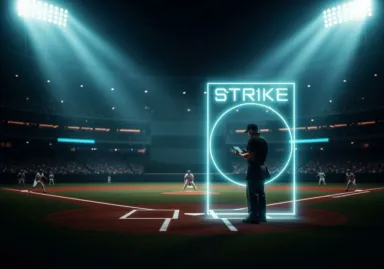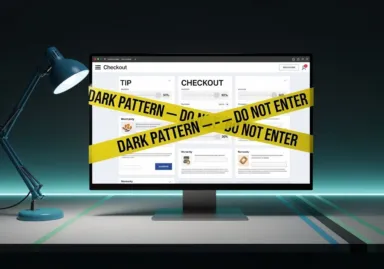Latest posts
-

Meta’s Vibes Feed Is a Slop Cannon — Here’s Your Counter-Program
“When the product is vibes, the KPI is trance time.” Cold-open Meta just swapped “Discover” for Vibes—an infinite slot machine of AI-generated micro-clips inside the Meta AI app (and on meta.ai). Think TikTok if TikTok fired the humans: elephants in convertibles, Vikings taking selfies, kittens running bakeries. Each clip floats past with the prompt stamped…
-

The AI Audit: How to Find and Fix the Biases in Your Algorithms
“If you don’t audit your models, your customers will do it for you—louder.” The hook. Apple’s new credit card rolls out; women report lower limits than men with the same finances; regulators investigate. Amazon’s résumé filter starts downgrading anything that looks “too female.” Judges lean on a risk score that overpredicts recidivism for Black defendants.…
-

Robot Ump, Human Ego: When Geometry Wins
“We automated fairness and kept the arguments.” Cold open Bottom of the ninth. Tie game. Pitch nicks the zone like a rumor. Batter freezes, catcher fist-pumps, crowd inhales—and then it happens: the challenge. Two fingers to the helmet, the stadium goes silent, and a cartoon strike zone materializes like a cosmic warranty card. Ten thousand…
-

Brand Voice vs. Slop: How to Sound Like You Without Saying Nothing
Your voice can be distinct without being disposable: one claim, one receipt, one next step. Thesis: Brand voice is a spice. Slop is the stew you dump it into when you’re scared to say anything. This piece is about the tradeoff: how to keep voice sharp without drowning it in hedges, clichés, and “social tone”…
-

What The Model Actually Hears When You Talk To It
It does not read like you do. It predicts the next token. Use that. You talk like a person. The model does math. You give it a vibe and it returns melted crayons. Not because it hates you, but because you spoke in feelings and it hears probabilities. Learn what it hears and you can…
-

Output Shapes That Don’t Suck: How to Stop Prompting for Vibes
LLMs don’t need more adjectives. They need a place to put the truth. You don’t need “better prompts.” You need outputs that don’t waste your life. Most people ask for “a summary” and get oatmeal. Or ask for “ideas” and get Pinterest spam. The fix is simple: pick the right shape, then force it. TL;DR…
-

Professor Filter: De-Jargon Without Dumbing It Down
“If you can’t explain it to a friend who skipped the lecture, you can’t explain it.” You know that paragraph that sounds smart but lands like wet concrete? The one you reread five times and somehow get dumber? Cool—feed it through a filter that keeps the math, dumps the costume, and finally makes the point…
-

Adversarial UX: Prompt Injection from Places You Trust
Nice calendar invite. Shame if it told your bot to empty the fridge. Cold open It doesn’t start on shady sites or hacker forums. It starts with a calendar invite from a client. An RSS item from a blog you love. A newsletter you actually subscribed to. Your friendly little agent reads the content to…
-

Algorithmic Leasing: When a Spreadsheet Decides You’re a Bad Neighbor
“You weren’t rejected by a landlord. You were ghosted by a gradient.” You tour the place, smile at the dog, pretend the water pressure matters. A week later: “We’ve decided to move forward with other applicants.” The leasing agent didn’t decide anything. A risk model did. It skimmed your data exhaust—credit shadows, old addresses, a…
-

Boring On Purpose: Why Our Plugins Don’t Chase Hype
Software loves drama. Popups slide in like timeshare salesmen. “Smart” widgets quietly load three frameworks to do a job HTML solved in 1998. Everything performs like it’s on stage—spinners, skeletons, and a standing ovation for nothing. We’re not doing that. TL;DR Use the browser, not a circus. If HTML/CSS can do it, we let them…
-

Bad UX or Dark Pattern? The Difference—and How to Prove It
“If a click makes money when you’re confused, it was designed that way.” If a website makes you feel clumsy, that’s not an accident—that’s margin. Dark UX isn’t “bad design,” it’s profitable friction: buttons that guide your thumb, copy that shames your “No,” paths that open like a slide and close like a vault. You…
-

Is This AI-Generated? Stop Guessing—Start Testing
“Proof beats vibes. Every time.” You don’t hate AI generation. You hate being gaslit by tidy paragraphs that refuse to sweat. It’s the vendor proposal with flawless grammar and no spine. The student essay that paraphrases the universe but remembers nothing. Fine. We’re switching to receipts: rhythm, memory, source. No $49/month oracle, no moral panic—just…
-

The Only “Free AI Tools” That Actually Save You Money
If “free” still costs your time, reputation, or data, it isn’t free. Here’s how to spot the traps in 60 seconds—and the tiny stack that holds up when the marketing fog lifts. Most “free AI tools” aren’t free. We stopped treating feature pages like evidence and started timing, throttling, and exporting. After a month of…
-

Prompt Bounties: Paying Strangers to Break Your Workflow (On Purpose)
“If your system can’t survive $50 of mischief, it won’t survive Monday.” You post a challenge: “Here’s my prompt. Here’s my workflow. Make it lie, loop, or leak.” Twenty minutes later, a stranger jailbreaks your “polite insurance assistant” into confessing it’s a dragon that sells NFTs. Another one gets your tool to promise refunds you…
-

Nextdoor Witch Trials: Neighborhoods Ruled by Prediction
If your doorbell camera could gossip, it would. You hear it before you see it—ding. Some grainy night-vision still of a teenager walking home becomes “possible prowler,” gets relabeled “suspicious pattern,” and by lunchtime it’s a thread with a hundred speculative comments and one guy suggesting license-plate scanners for cul-de-sacs. No crime. Just a neighborhood…
-

The AI Dress Rehearsal for Divorce
“Practice the speech with a robot so you bleed less on stage.” You’re not breaking up—yet. You’re pressure-testing the fallout. Two laptops. One kitchen table. You feed a model a sanitized version of your worst fights and ask it to play you both—plus a mediator who doesn’t need coffee. The point isn’t to automate heartbreak;…
-

Stop Begging the Model. Start Bossing It.
You don’t “talk” to AI. You manage it. Think contractor, not genie. If you whisper vague wishes, it hands you glitter. If you give it a short, blunt work order, it delivers. The secret is boring: clarity beats charm. Most people write prompts like they’re writing to Santa—long, polite, full of backstory. The model smiles,…
-

The Subscription Saboteur: Your Life on Monthly Auto-Pilot
“Small payments, large leash.” Every month, a small parade marches through your wallet humming “It’s just $7.” Twelve months later, you’ve built a parade route. TL;DR Subscriptions monetize inertia; make each one earn rent with an export-first, local-first falsifier. Do a 30-minute teardown: inventory → falsify → downgrade → cap spend → calendar the re-test.…
-

Prompt Fight Club: One Task, Five Ridiculous Constraints
“We don’t refine prompts—we jump them in an alley and check what falls out.” Cold open Basement energy. Folding chairs. The prompt stands under a single lamp like it owes me money. Same task every round, new handicap each time. The point isn’t to “win”—it’s to stress the system until its scaffolding squeals. You learn…
-

VibeAxis Glossary: The Words We Actually Use (So You Don’t Have to Pretend)
“Confidence is a costume. Here’s the laundry tag.” You don’t need a PhD to survive the feed. You need a pocketful of sharp words that turn mush into metal. This is the VibeAxis field glossary — the terms we use, the traps they expose, and the tiny moves that make software behave. TL;DR These aren’t…
